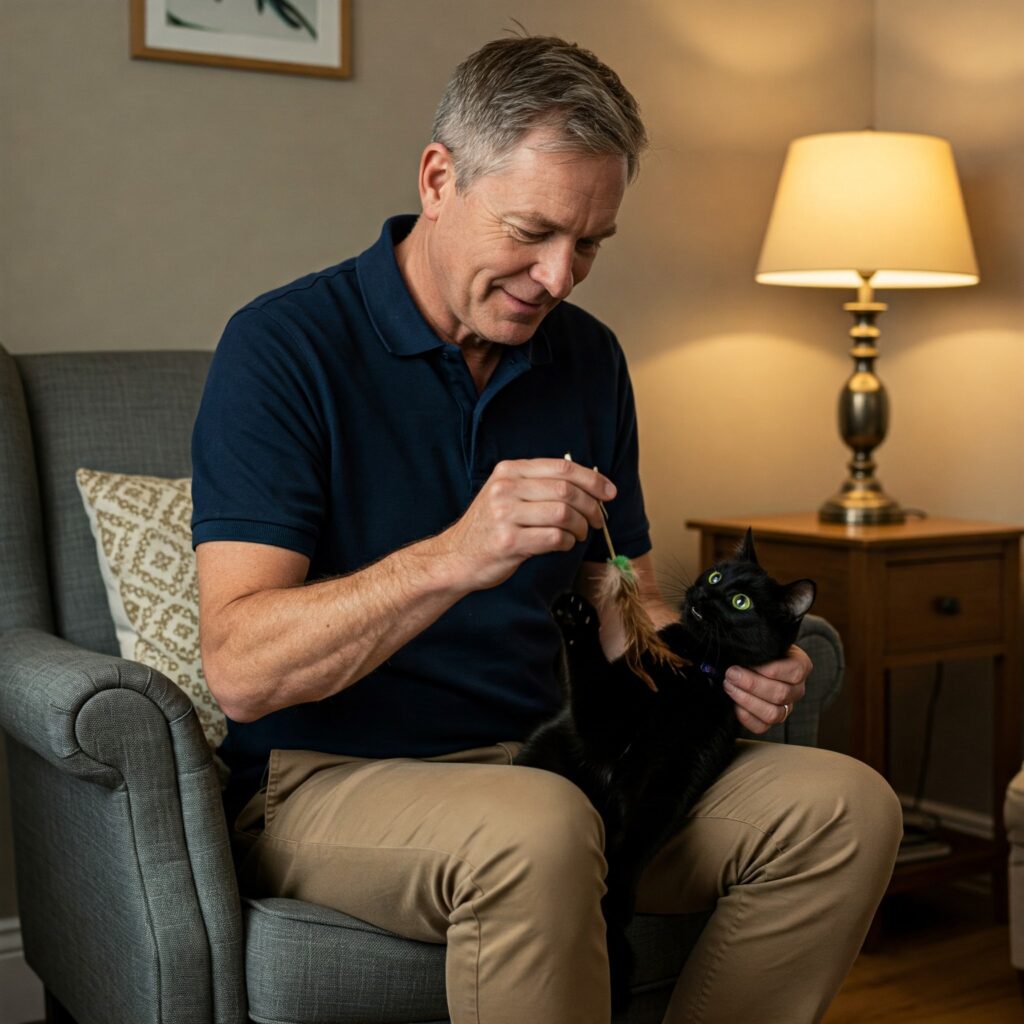
As a devoted cat parent, leaving your feline friend behind when you travel can be a source of significant anxiety. While cats have a reputation for independence, they still require proper care, attention, and companionship in your absence. This is where professional cat sitting services come into play—providing peace of mind while ensuring your cat stays comfortable in their familiar environment.
In this comprehensive guide, we’ll explore everything you need to know about cat sitting services, from understanding how they work to finding the perfect match for your precious pet. Whether you’re planning a weekend getaway or an extended vacation, this article will help you navigate the world of cat sitting with confidence.
What Is Cat Sitting, and How Does It Work?
Cat sitting is a specialized pet care service where a professional caregiver visits your home to look after your feline companion while you’re away. Unlike traditional boarding options that require relocating your cat to an unfamiliar environment, in-home cat sitting allows your pet to remain in their comfort zone—maintaining their routine and reducing stress.
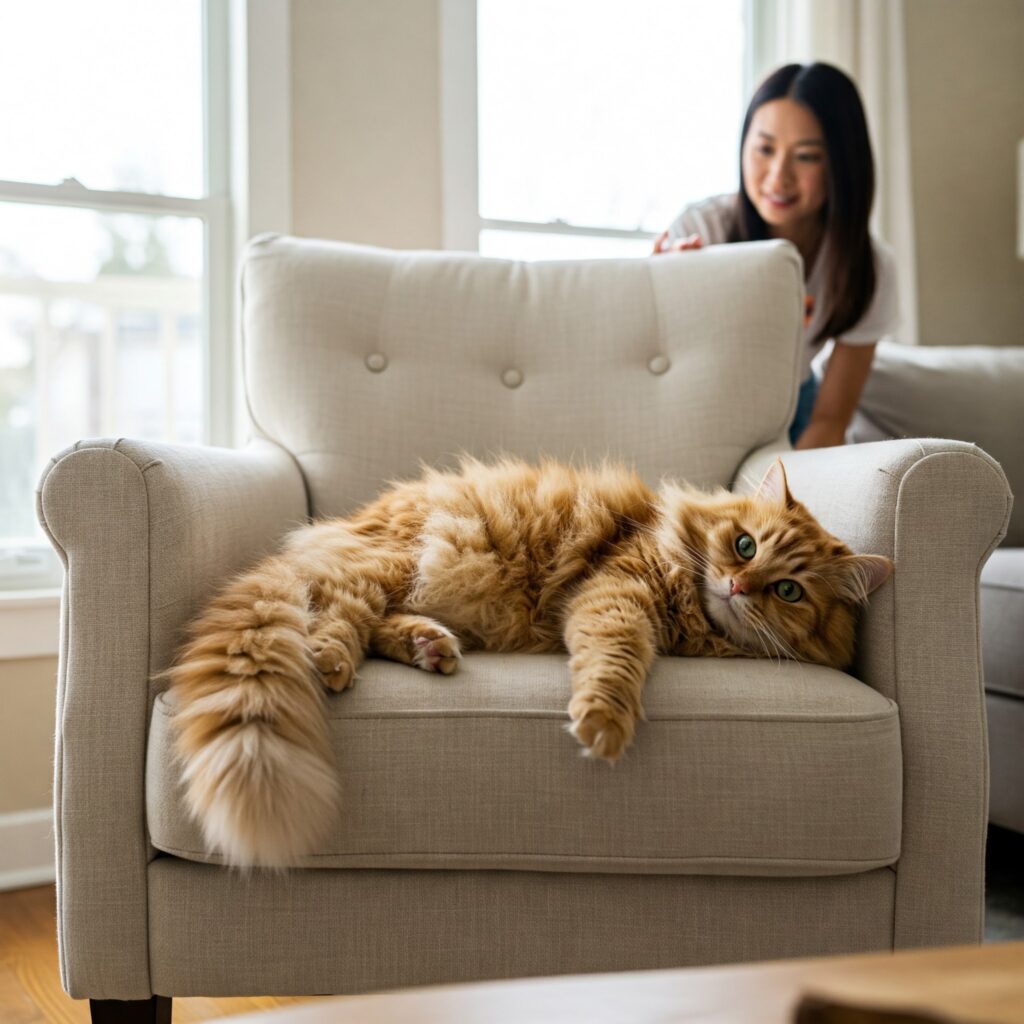
The process typically works like this:
- Initial consultation: Meet with potential sitters to discuss your cat’s needs, routines, and any special requirements.
- Schedule setup: Arrange visit frequency and duration based on your cat’s needs and your travel plans.
- Home access: Provide the sitter with keys or access codes to your home.
- Detailed instructions: Leave comprehensive care guidelines, including feeding schedules, medication instructions, and emergency contacts.
- Regular updates: Most professional sitters send updates, photos, or videos during their visits.
- Post-service wrap-up: Upon your return, the sitter typically provides a summary of their visits and your cat’s behavior.
The beauty of cat sitting is its flexibility. Services can range from quick daily check-ins to extended overnight stays, depending on your cat’s temperament and needs.
How Much Does a Cat Sitter Cost?
The cost of cat sitting services varies depending on several factors, including your location, visit duration, number of pets, and the specific services required. In the United States, you can generally expect to pay between $15 and $30 for a standard 30-minute visit. Longer visits or overnight stays typically range from $50 to $100 per night.
Factors that may influence pricing include:
- Geographic location: Urban areas typically command higher rates than rural settings.
- Visit duration: Longer visits cost more than brief check-ins.
- Number of pets: Many sitters charge additional fees for multiple cats.
- Special services: Medication administration, special feeding requirements, or extra playtime may incur additional charges.
- Experience level: Highly experienced or certified sitters may charge premium rates.
- Holiday or last-minute bookings: Expect surcharges during peak travel seasons or for last-minute arrangements.
It’s worth noting that while professional cat sitting might seem more expensive than asking a neighbor to check in, the peace of mind that comes with hiring a trained, insured professional is often worth the investment.
Finding a Trustworthy and Reliable Cat Sitter
Entrusting someone with both your beloved pet and access to your home requires careful consideration. Here are some effective strategies for finding a trustworthy cat sitter:
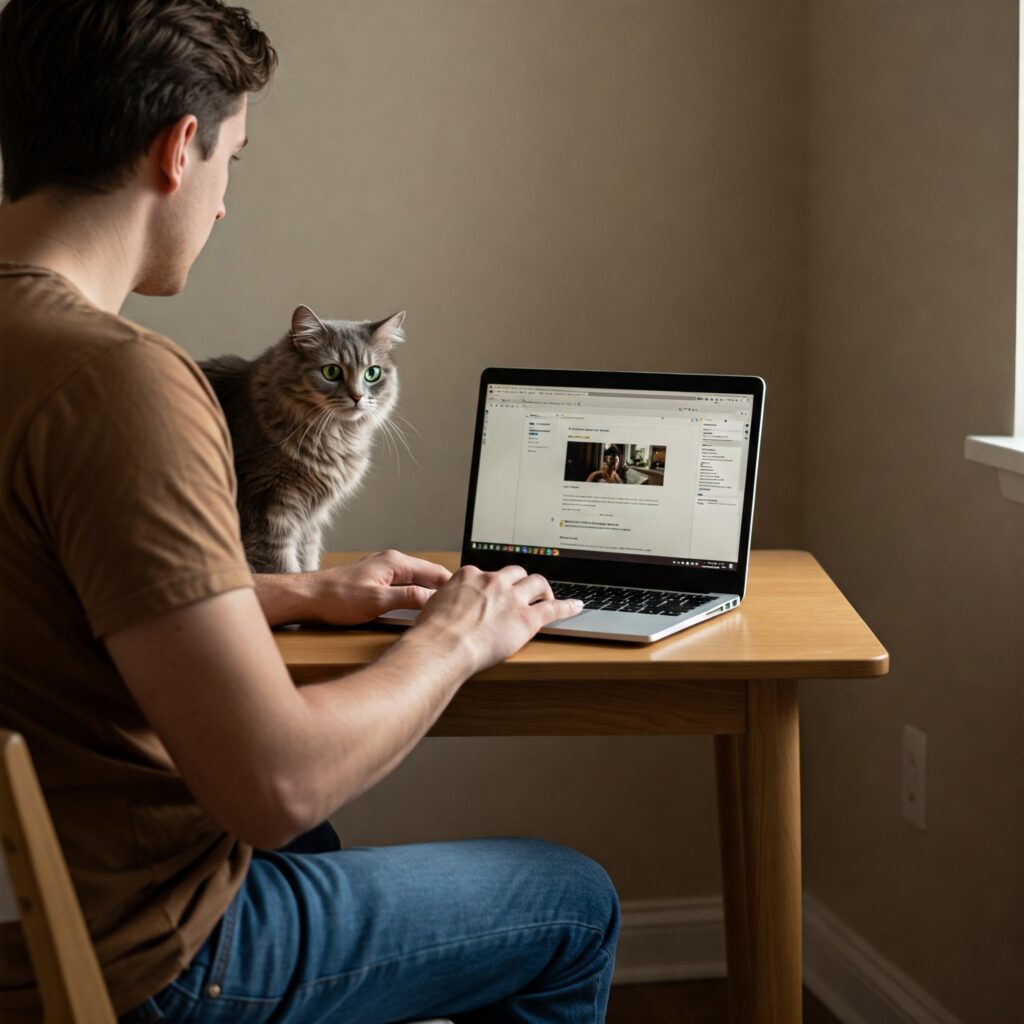
1. Seek Personal Recommendations
Start by asking fellow cat owners in your neighborhood, friends, family, or colleagues for referrals. Personal recommendations often provide valuable insights about the sitter’s reliability and quality of service.
2. Consult Your Veterinarian
Many veterinary clinics maintain lists of reputable pet sitters or may have staff members who offer sitting services on the side. These individuals typically have valuable medical knowledge that could prove crucial in an emergency.
3. Use Professional Platforms
Several online platforms specialize in connecting pet owners with verified sitters:
- Rover.com: Features profiles, reviews, and background checks
- Care.com: Offers detailed vetting processes
- TrustedHousesitters: Connects homeowners with sitters willing to care for pets in exchange for accommodation
- Pet Sitters International: Provides a directory of certified professional sitters
4. Check Credentials and Insurance
Reputable cat sitters should have:
- Bonding and insurance: Protects you in case of theft or damage
- Pet first aid certification: Ensures they can handle minor emergencies
- Professional membership: Affiliations with organizations like Pet Sitters International or the National Association of Professional Pet Sitters
5. Conduct a Thorough Interview
Before making your selection, arrange a meet-and-greet to observe how the potential sitter interacts with your cat. This initial meeting provides insight into their comfort level with animals and allows your cat to become familiar with them.
Key questions to ask during the interview:
- What is your experience with cats specifically?
- How do you handle nervous or shy cats?
- What would you do in case of a medical emergency?
- Can you administer medications if needed?
- How will you communicate updates during my absence?
- Do you have backup sitters available if you’re unable to make a scheduled visit?
Can I Meet the Cat Sitter Before Booking?
Absolutely! In fact, a preliminary meeting should be considered essential, not optional. This initial consultation serves multiple purposes:
- Assessing compatibility: You can evaluate whether the sitter’s personality and approach align with your expectations.
- Introducing your cat: Allows your cat to become familiar with the sitter in your presence, reducing anxiety during actual sitting sessions.
- Demonstrating routines: Provides an opportunity to show specific feeding procedures, medication techniques, or playtime preferences.
- Discussing contingencies: You can walk through emergency scenarios and establish protocols.
- Touring your home: The sitter can familiarize themselves with your space, including the location of supplies, litter boxes, and potential hiding spots.
Most professional cat sitters not only accommodate these preliminary meetings but actively encourage them as part of their service. Many even offer this initial consultation free of charge or at a reduced rate.
Do Cat Sitters Stay Overnight or Visit Only During the Day?
The beauty of professional cat sitting services lies in their flexibility. Most sitters offer various service options to accommodate different cats’ needs and owner preferences:
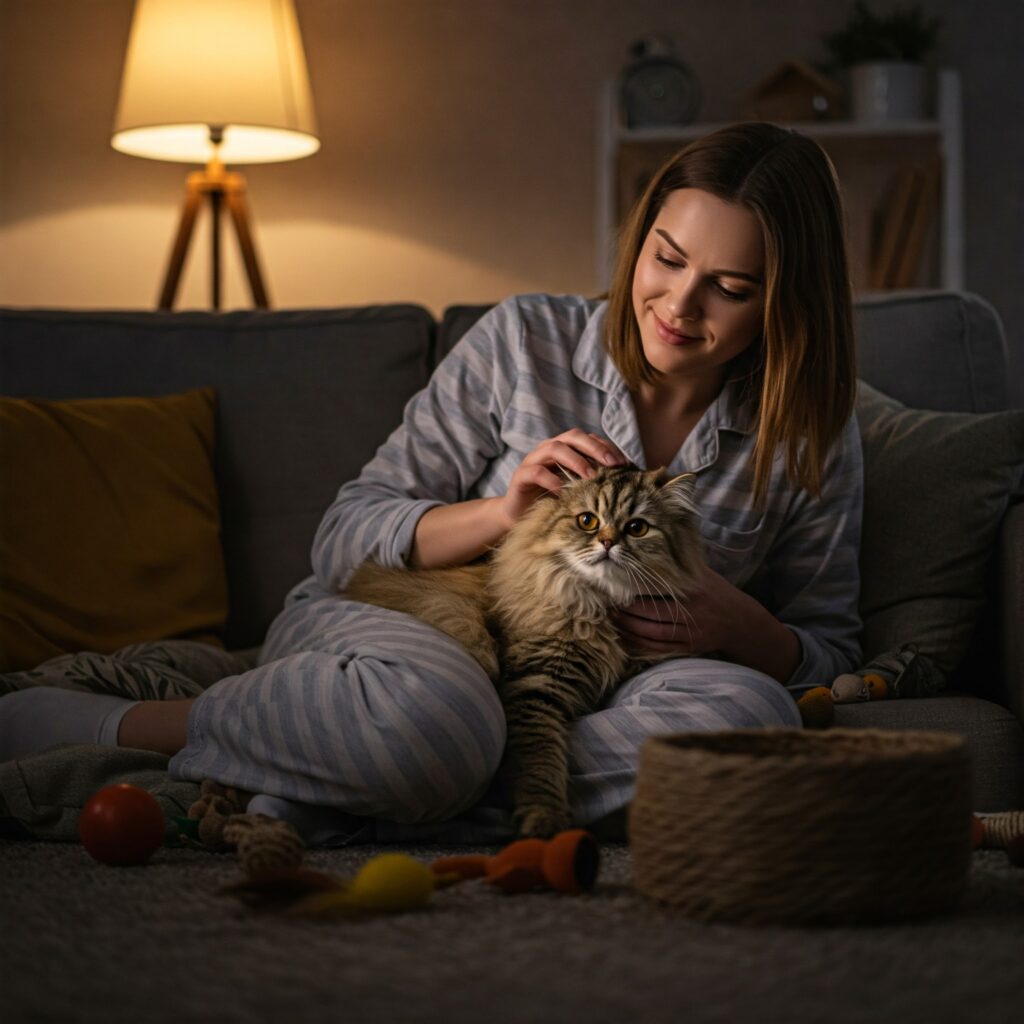
Day Visit Options
- Quick check-ins: Brief 15-20 minute visits to refresh food, water, and litter
- Standard visits: 30-minute sessions that include basic care plus some interaction
- Extended visits: 45-60 minute appointments with ample playtime and attention
Overnight Options
- Evening to morning stays: The sitter arrives in the evening and leaves the following morning
- Full 24-hour care: The sitter essentially house-sits while caring for your cat
- Hybrid arrangements: Combining overnight stays with additional daytime visits
The best choice depends on your cat’s temperament and needs. Highly social cats or those requiring regular medication often benefit from overnight care, while more independent felines might do fine with daily visits. Senior cats, kittens, or pets with medical conditions typically require more frequent check-ins or overnight supervision.
What Happens If My Cat Sitter Cancels?
Even the most reliable sitters may occasionally face emergencies or unexpected situations. Professional cat sitting services typically have contingency plans in place:
Backup Sitter Systems
Reputable individual sitters and agencies maintain networks of qualified backup caregivers who can step in if the primary sitter becomes unavailable. These backup sitters should:
- Be familiar with your cat and home setup
- Have access to your detailed care instructions
- Possess similar qualifications as your primary sitter
Emergency Protocols
Well-prepared sitters establish clear communication procedures for cancellations:
- Providing advance notice whenever possible
- Offering immediate notification if last-minute issues arise
- Arranging backup care without additional client effort
- Maintaining detailed notes about your cat’s care for substitutes
What You Can Do
To protect yourself from potential cancellations:
- Discuss contingency plans during your initial consultation
- Request to meet backup sitters in advance when possible
- Maintain a list of emergency contacts (friends or family) who could help in a pinch
- Consider working with an agency rather than an individual if backup options are crucial
Are There Extra Fees for Multiple Cats?
Most cat sitters do charge additional fees for caring for multiple cats, though the pricing structure varies widely. This additional charge typically ranges from $5 to $15 per additional cat per visit.
The extra fees account for:
- Increased time requirements: More cats mean more individual attention, feeding, and litter box cleaning
- Additional complexity: Managing multiple personalities and potentially different care routines
- Greater responsibility: More pets increase the likelihood of needing to address behavioral or health issues
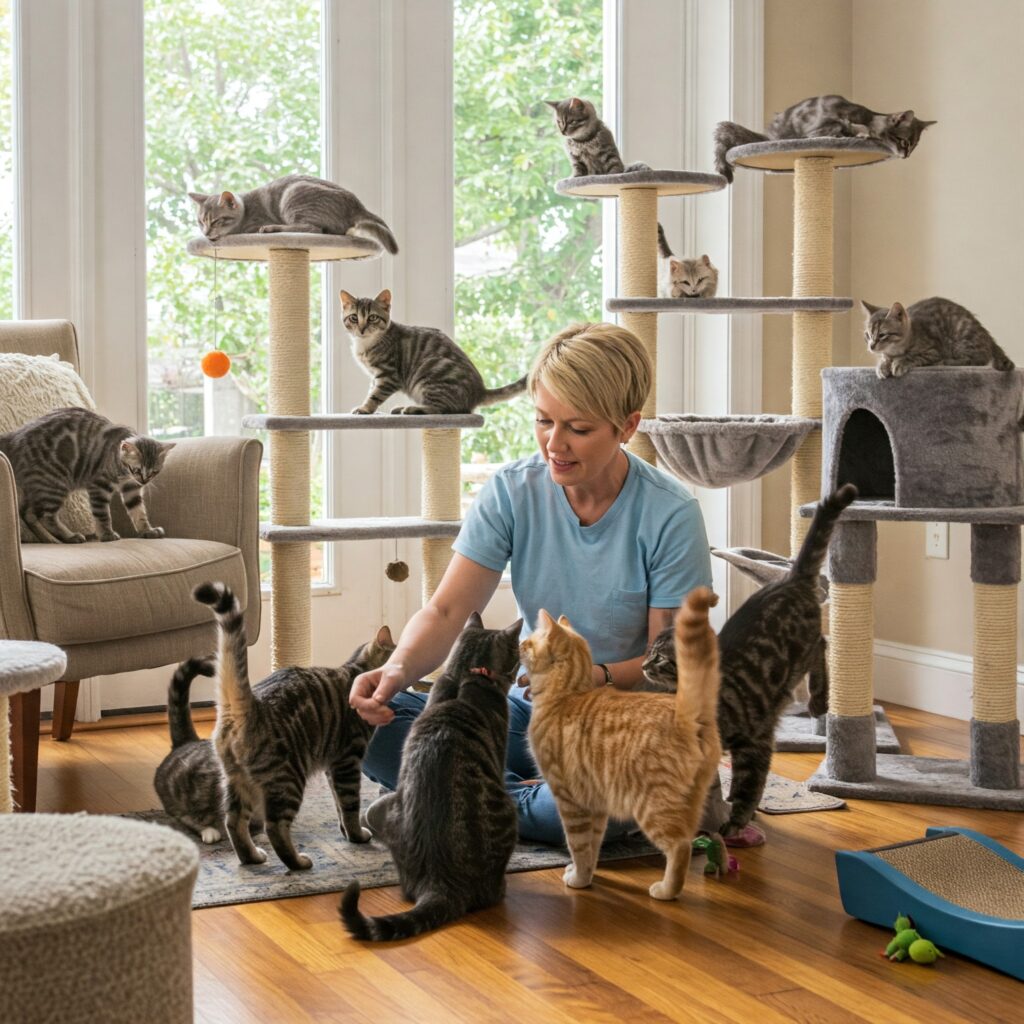
However, many sitters offer package deals or discounted rates for households with multiple felines. Some pricing structures you might encounter include:
| Number of Cats | Typical Pricing Structure |
|---|---|
| 1 cat | Base rate (e.g., $20 per 30-min visit) |
| 2 cats | Base rate + $5-10 additional |
| 3 cats | Base rate + $10-15 additional |
| 4+ cats | Custom pricing or per-cat rates |
When interviewing potential sitters, be transparent about the number of cats in your household and inquire about their multiple-cat pricing policies. Some sitters may be willing to negotiate rates for long-term arrangements.
What Information Should I Provide to My Cat Sitter?
Comprehensive information is the foundation of successful cat sitting arrangements. The more details you provide, the better equipped your sitter will be to care for your feline friend properly.
Essential Information Checklist
1. Cat-Specific Details:
- Complete feeding instructions (amounts, times, locations)
- Medication schedules and administration techniques
- Favorite toys, games, and interaction preferences
- Hiding spots where your cat might retreat when anxious
- Behavioral quirks or special habits
- Treats—types and permitted quantities
- Grooming requirements or preferences
2. Home Information:
- Detailed home access instructions
- Alarm system codes and operation guidelines
- Location of pet supplies, food, and medications
- Thermostat settings and instructions
- Mail/package handling preferences
- Plant care instructions (if applicable)
- Trash and recycling schedules
3. Emergency Information:
- Your contact details and preferred communication methods
- Veterinary information (regular vet and emergency clinic)
- Nearby friend or family member as backup contact
- Pet insurance information (if applicable)
- Cat’s medical history and any current conditions
Pro Tip: Create a dedicated “Cat Sitting Binder” containing all this information, including recent photos of your cat and any necessary release forms authorizing veterinary care in your absence.
Can a Cat Sitter Handle Special Needs or Routines for My Pet?
Absolutely! Professional cat sitters are typically equipped to handle a wide range of specialized care requirements. However, it’s crucial to discuss any special needs during your initial consultation to ensure the sitter has the necessary skills and experience.
Common Special Needs Services
Medical Requirements:
- Medication administration: Including pills, liquids, injections, and topical treatments
- Subcutaneous fluid therapy: For cats with kidney disease or dehydration issues
- Wound care and dressing changes: For cats recovering from surgery or injuries
- Mobility assistance: For elderly or disabled cats
Behavioral Accommodations:
- Anxiety management: Techniques for calming nervous or anxious cats
- Socialization for shy cats: Gradual approaches for fearful felines
- Enrichment for high-energy cats: Interactive play sessions and mental stimulation
Dietary Needs:
- Special diets: Preparing prescription or specialized meals
- Multiple feeding schedules: For cats requiring frequent small meals
- Food allergies management: Careful handling of ingredients and feeding areas
When discussing special needs with potential sitters, ask about:
- Their specific experience with your cat’s condition
- Any additional certifications or training they possess
- Their comfort level with the required procedures
- Whether additional fees apply for specialized care
For cats with complex medical needs, consider sitters with veterinary technician backgrounds or those who specialize in medical pet care. These professionals typically command higher rates but offer invaluable expertise and confidence when handling complicated care routines.
How Do Payments for Cat Sitting Services Work?
Payment processes vary across different cat sitting services, but most follow standard industry practices. Understanding the payment expectations upfront helps avoid confusion and ensures a smooth professional relationship.
Common Payment Methods
Most professional cat sitters accept:
- Cash: Traditional but less common in professional settings
- Mobile payment apps: Venmo, PayPal, Zelle, or Cash App
- Credit/debit cards: Particularly with agency services or larger operations
- Checks: Accepted by some individual sitters, though becoming less common
Payment Timing
The industry standard typically involves:
- Booking deposit: Many sitters require a non-refundable deposit (often 25-50% of the total) to secure your dates
- Balance payment: The remaining amount is usually due either before service begins or at the conclusion of services
- Recurring clients: Regular clients may have special arrangement options, such as monthly billing
Cancellation Policies
Be sure to understand the sitter’s cancellation policy, which commonly follows this structure:
- 7+ days notice: Full refund minus booking deposit
- 3-7 days notice: 50% refund of remaining balance
- Less than 3 days: No refund (with possible exceptions for emergencies)
Insert image of a person making a mobile payment to a cat sitter here
Essential Supplies for Your Cat Sitter
Ensure your cat sitter has everything they need by preparing these supplies in advance:
Basic Necessities
- Ample food supply: Provide at least 25% more than you expect your cat to consume
- Fresh litter: Include extra for longer absences
- Cleaning supplies: Paper towels, pet-safe cleaner, and garbage bags
- Food and water bowls: Clean and easily accessible
- Medications: Clearly labeled with detailed instructions
- Carrier or crate: In case emergency transportation is needed
Comfort and Enrichment
- Favorite toys: Refresh interactive toys that might be getting worn
- Scratching posts/pads: Multiple options throughout the home
- Comfortable bedding: Clean and placed in favorite spots
- Cat treats: For rewards and special moments
Top Product Recommendations for Cat Sitting Success
To enhance your cat’s comfort and your sitter’s effectiveness during your absence, consider these top-rated products:
For Your Cat’s Comfort and Entertainment:
- Catit’s Vesper High Base – This modern, multi-level furniture provides perfect lounging spots, scratching surfaces, and play opportunities. Its elevated design gives cats the vertical territory they crave, reducing anxiety during your absence.
- Kitty Cot Window Perch – This durable suction-cup perch creates a perfect window-level lounging spot, allowing your cat to enjoy bird-watching and sunbathing while you’re away.
- Boots & Barkley Tunnel – A fun and interactive tunnel toy that provides both a hiding spot and play area, helping to keep your cat mentally stimulated during your absence.
- Wave Scratcher by Boots & Barkley – This sisal and carpet scratcher helps satisfy your cat’s natural scratching instincts, reducing stress and protecting your furniture.
- Cat Cave Bed by Feltcave – A cozy wool bed that offers warmth and security, creating a perfect retreat for napping cats who might be missing their human.
For Feeding and Care:
- PetSafe Automatic Feeder – This programmable feeder ensures timely meals if your sitter can’t maintain exact feeding schedules. It provides backup feeding security for multiple daily meals.
- PetSafe Drinkwell Fountain – An automatic water fountain that keeps your cat hydrated with fresh, filtered water throughout the day.
- Litter Genie Plus Pail – This odor-controlling litter disposal system makes waste management easier for your sitter, ensuring a clean environment for your cat.
- Sheba Premium Wet Cat Food (Chicken Loaf) – High-quality wet food in convenient pouches that are easy for sitters to portion and serve.
- Me-O Kitten Food (Persian) – Specialized dry food for Persian kittens with specific nutritional needs.
For Monitoring and Peace of Mind:
- Smart Pet Camera (e.g., Furbo) – Monitor your pet remotely with two-way audio and video features, allowing you to check in on both your cat and your sitter.
- Feliway Classic Diffuser – This stress-relieving pheromone diffuser helps keep cats calm during your absence, reducing anxiety behaviors.
- Pet Grooming Kit by Hertzko – Includes brushes and combs to maintain your cat’s coat while you’re away, especially helpful for long-haired breeds.
- Portable First Aid Kit for Pets – Essential supplies for emergencies during sitting assignments, giving both you and your sitter peace of mind.
- Emergency Contact Notebook – A handy tool to store veterinary details and client instructions during assignments, ensuring all important information is organized in one place.

Conclusion: Creating a Stress-Free Cat Sitting Experience
Finding the right cat sitting solution requires careful consideration of your cat’s unique personality and needs. While some cats thrive with daily visits, others may require overnight care or more frequent check-ins. The key is understanding your feline friend and communicating clearly with your chosen professional.
Remember that professional cat sitting offers numerous advantages over traditional boarding options:
- Reduced stress: Your cat remains in their familiar environment
- Maintained routines: Regular feeding, medication, and playtime schedules stay consistent
- Home security: Regular presence deters potential break-ins
- Personalized attention: One-on-one care tailored to your cat’s preferences
By following the guidelines in this article—from selecting a trustworthy sitter to preparing comprehensive instructions—you can ensure your cat receives excellent care during your absence. This attention to detail allows you to enjoy your time away, confident that your feline companion is in capable and caring hands.
Have you used professional cat sitting services before? Share your experiences and tips in the comments below!

[…] mental engagement is particularly important for indoor cats, who don’t have the natural stimulation of the outdoors. Regular play with interactive toys […]